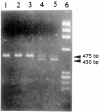Abstract
Adenine phosphoribosyltransferase (APRT) deficiency is a genetic disorder which causes 2,8-dihydroxy-adenine urolithiasis. The estimated incidence of heterozygosity in Caucasian and Japanese populations is 1%. Mutant alleles responsible for the disease have been classified as APRT*Q0 (type I) and APRT* (type II). In our previous study, we demonstrated in APRT*J a single common base change which accounts for 70% of the Japanese mutants. The present report describes the analysis of an APRT*Q0 mutation in Japanese subjects. Two nucleotide substitutions common to all seven affected alleles from four unrelated subjects (three homozygotes and a heterozygote) were identified: G----A at nucleotide position 1453 and C----T at 1456. The G----A altered the amino acid Trp98 to a stop codon. The C----T did not alter Ala99. These point mutations were demonstrated by sequence analysis of polymerase chain reaction (PCR)-amplified genomic DNA and cDNA. The G----A change at 1453 results in the elimination of a PflMI site in the APRT gene. PflMI digests, which were used to confirm the G----A transition, can be useful in screening for this specific mutation.
Full text
PDF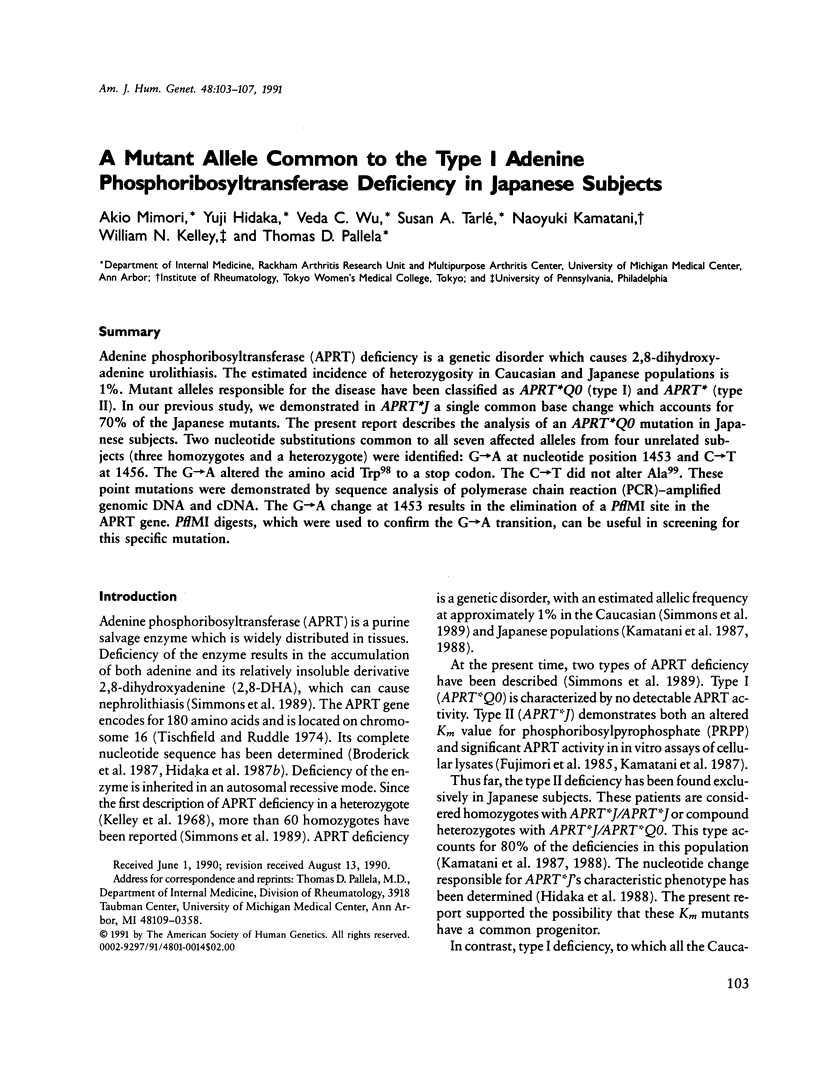
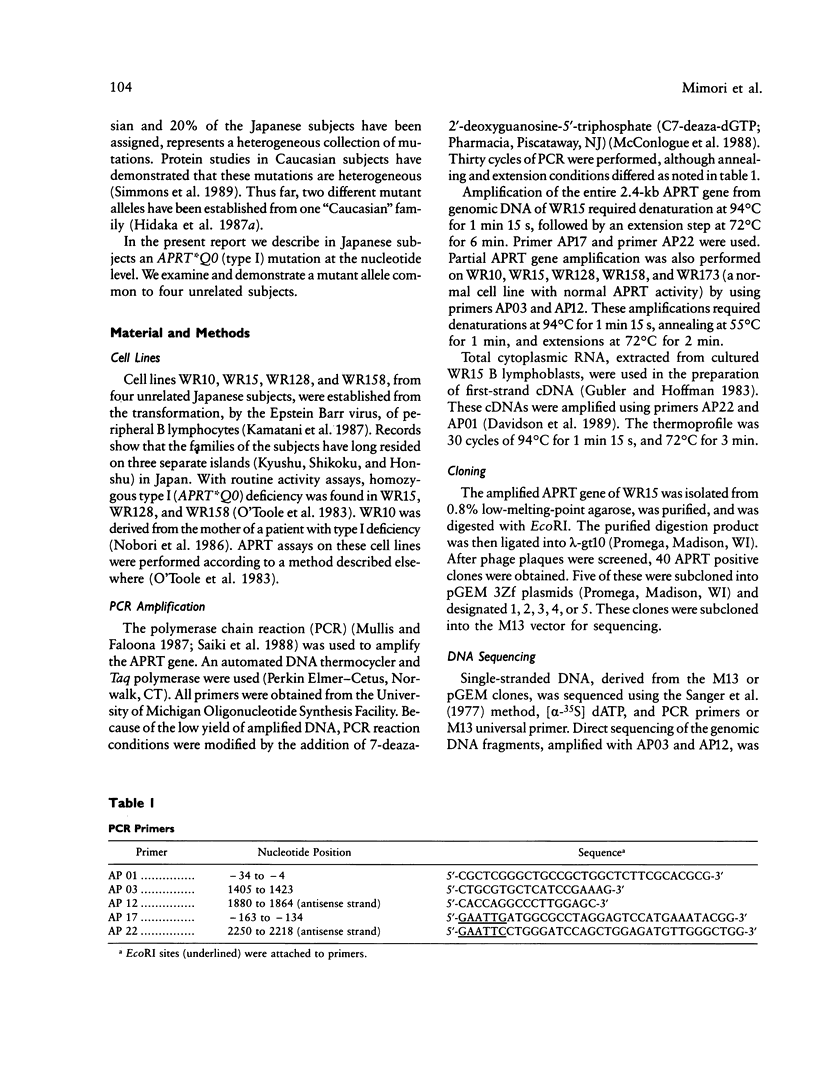
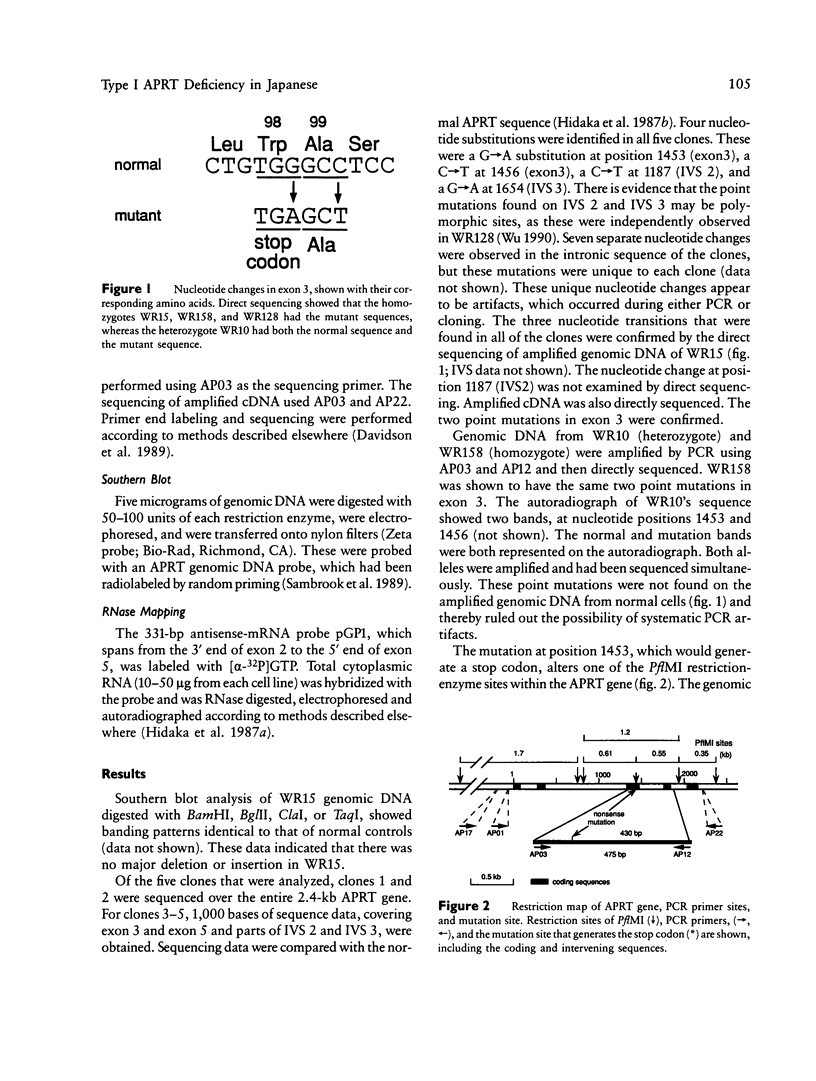
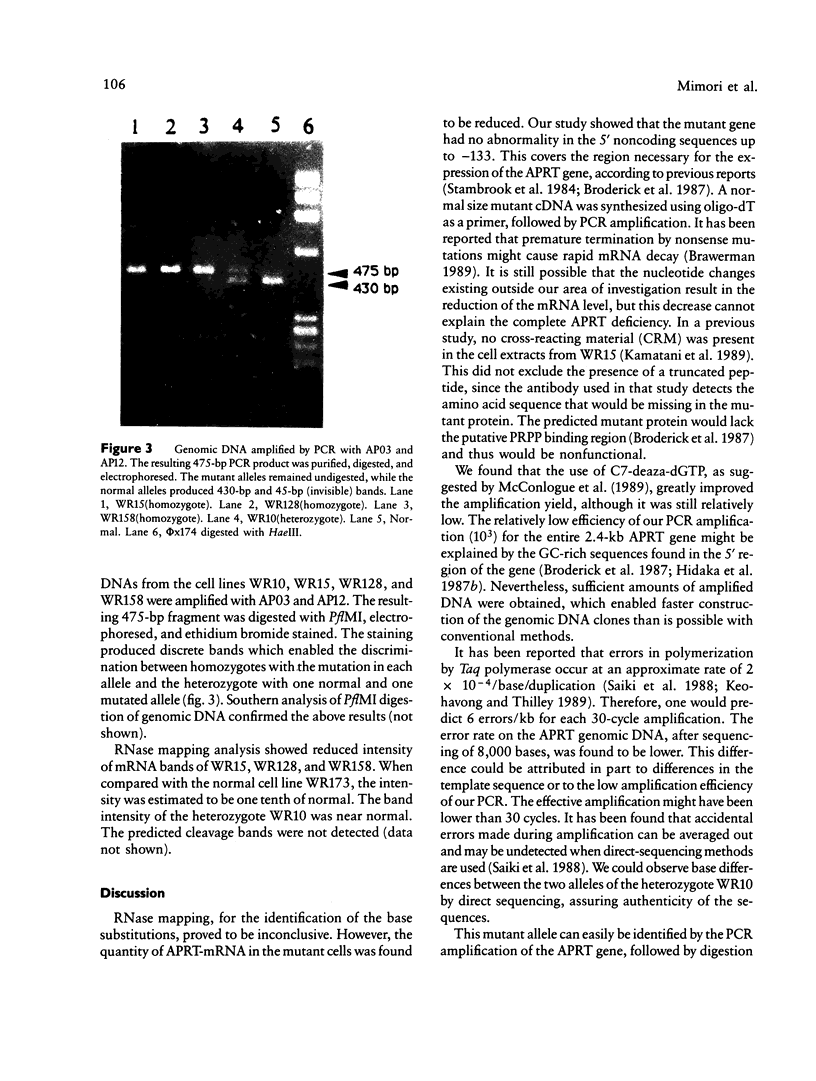
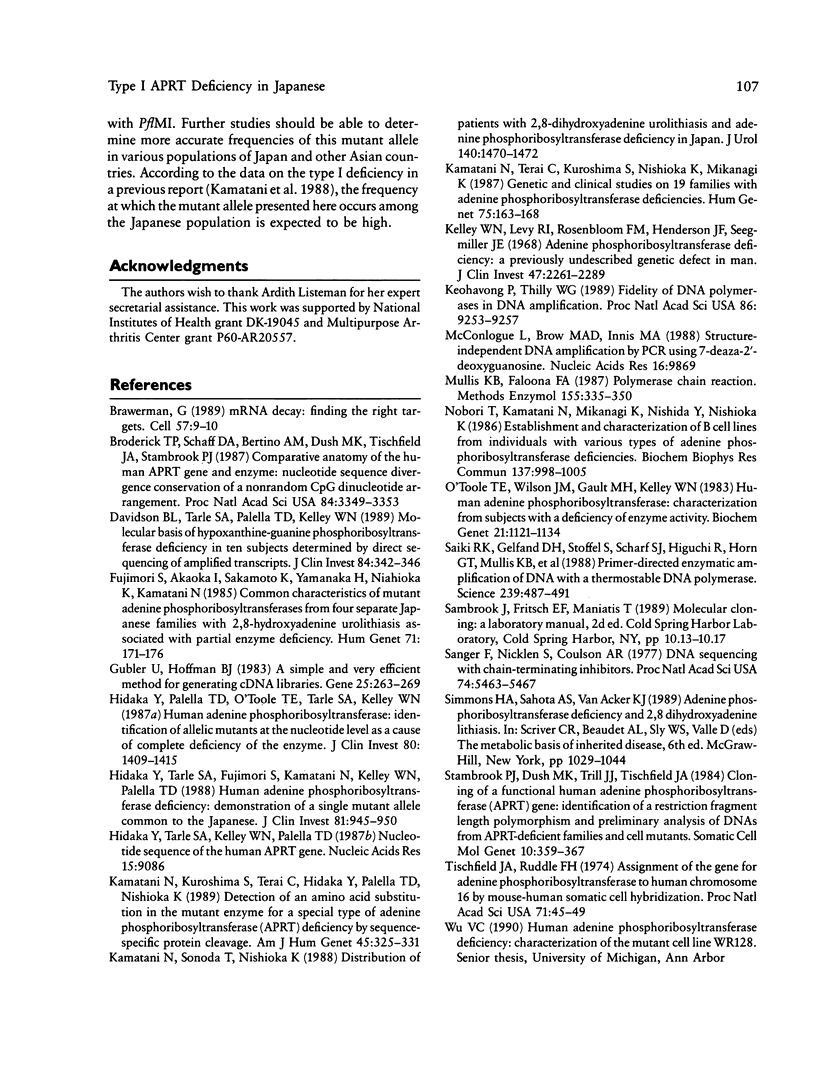
Images in this article
Selected References
These references are in PubMed. This may not be the complete list of references from this article.
- Brawerman G. mRNA decay: finding the right targets. Cell. 1989 Apr 7;57(1):9–10. doi: 10.1016/0092-8674(89)90166-9. [DOI] [PubMed] [Google Scholar]
- Broderick T. P., Schaff D. A., Bertino A. M., Dush M. K., Tischfield J. A., Stambrook P. J. Comparative anatomy of the human APRT gene and enzyme: nucleotide sequence divergence and conservation of a nonrandom CpG dinucleotide arrangement. Proc Natl Acad Sci U S A. 1987 May;84(10):3349–3353. doi: 10.1073/pnas.84.10.3349. [DOI] [PMC free article] [PubMed] [Google Scholar]
- Davidson B. L., Tarlé S. A., Palella T. D., Kelley W. N. Molecular basis of hypoxanthine-guanine phosphoribosyltransferase deficiency in ten subjects determined by direct sequencing of amplified transcripts. J Clin Invest. 1989 Jul;84(1):342–346. doi: 10.1172/JCI114160. [DOI] [PMC free article] [PubMed] [Google Scholar]
- Fujimori S., Akaoka I., Sakamoto K., Yamanaka H., Nishioka K., Kamatani N. Common characteristics of mutant adenine phosphoribosyltransferases from four separate Japanese families with 2,8-dihydroxyadenine urolithiasis associated with partial enzyme deficiencies. Hum Genet. 1985;71(2):171–176. doi: 10.1007/BF00283377. [DOI] [PubMed] [Google Scholar]
- Gubler U., Hoffman B. J. A simple and very efficient method for generating cDNA libraries. Gene. 1983 Nov;25(2-3):263–269. doi: 10.1016/0378-1119(83)90230-5. [DOI] [PubMed] [Google Scholar]
- Hidaka Y., Palella T. D., O'Toole T. E., Tarlé S. A., Kelley W. N. Human adenine phosphoribosyltransferase. Identification of allelic mutations at the nucleotide level as a cause of complete deficiency of the enzyme. J Clin Invest. 1987 Nov;80(5):1409–1415. doi: 10.1172/JCI113219. [DOI] [PMC free article] [PubMed] [Google Scholar]
- Hidaka Y., Tarlé S. A., Fujimori S., Kamatani N., Kelley W. N., Palella T. D. Human adenine phosphoribosyltransferase deficiency. Demonstration of a single mutant allele common to the Japanese. J Clin Invest. 1988 Mar;81(3):945–950. doi: 10.1172/JCI113408. [DOI] [PMC free article] [PubMed] [Google Scholar]
- Hidaka Y., Tarlé S. A., O'Toole T. E., Kelley W. N., Palella T. D. Nucleotide sequence of the human APRT gene. Nucleic Acids Res. 1987 Nov 11;15(21):9086–9086. doi: 10.1093/nar/15.21.9086. [DOI] [PMC free article] [PubMed] [Google Scholar]
- Kamatani N., Kuroshima S., Terai C., Hidaka Y., Palella T. D., Nishioka K. Detection of an amino acid substitution in the mutant enzyme for a special type of adenine phosphoribosyltransferase (APRT) deficiency by sequence-specific protein cleavage. Am J Hum Genet. 1989 Aug;45(2):325–331. [PMC free article] [PubMed] [Google Scholar]
- Kamatani N., Sonoda T., Nishioka K. Distribution of patients with 2,8-dihydroxyadenine urolithiasis and adenine phosphoribosyltransferase deficiency in Japan. J Urol. 1988 Dec;140(6):1470–1472. doi: 10.1016/s0022-5347(17)42075-1. [DOI] [PubMed] [Google Scholar]
- Kamatani N., Terai C., Kuroshima S., Nishioka K., Mikanagi K. Genetic and clinical studies on 19 families with adenine phosphoribosyltransferase deficiencies. Hum Genet. 1987 Feb;75(2):163–168. doi: 10.1007/BF00591080. [DOI] [PubMed] [Google Scholar]
- Kelley W. N., Levy R. I., Rosenbloom F. M., Henderson J. F., Seegmiller J. E. Adenine phosphoribosyltransferase deficiency: a previously undescribed genetic defect in man. J Clin Invest. 1968 Oct;47(10):2281–2289. doi: 10.1172/JCI105913. [DOI] [PMC free article] [PubMed] [Google Scholar]
- Keohavong P., Thilly W. G. Fidelity of DNA polymerases in DNA amplification. Proc Natl Acad Sci U S A. 1989 Dec;86(23):9253–9257. doi: 10.1073/pnas.86.23.9253. [DOI] [PMC free article] [PubMed] [Google Scholar]
- McConlogue L., Brow M. A., Innis M. A. Structure-independent DNA amplification by PCR using 7-deaza-2'-deoxyguanosine. Nucleic Acids Res. 1988 Oct 25;16(20):9869–9869. doi: 10.1093/nar/16.20.9869. [DOI] [PMC free article] [PubMed] [Google Scholar]
- Mullis K. B., Faloona F. A. Specific synthesis of DNA in vitro via a polymerase-catalyzed chain reaction. Methods Enzymol. 1987;155:335–350. doi: 10.1016/0076-6879(87)55023-6. [DOI] [PubMed] [Google Scholar]
- Nobori T., Kamatani N., Mikanagi K., Nishida Y., Nishioka K. Establishment and characterization of B cell lines from individuals with various types of adenine phosphoribosyltransferase deficiencies. Biochem Biophys Res Commun. 1986 Jun 30;137(3):998–1005. doi: 10.1016/0006-291x(86)90324-4. [DOI] [PubMed] [Google Scholar]
- O'Toole T. E., Wilson J. M., Gault M. H., Kelley W. N. Human adenine phosphoribosyltransferase: characterization from subjects with a deficiency of enzyme activity. Biochem Genet. 1983 Dec;21(11-12):1121–1134. doi: 10.1007/BF00488464. [DOI] [PubMed] [Google Scholar]
- Saiki R. K., Gelfand D. H., Stoffel S., Scharf S. J., Higuchi R., Horn G. T., Mullis K. B., Erlich H. A. Primer-directed enzymatic amplification of DNA with a thermostable DNA polymerase. Science. 1988 Jan 29;239(4839):487–491. doi: 10.1126/science.2448875. [DOI] [PubMed] [Google Scholar]
- Sanger F., Nicklen S., Coulson A. R. DNA sequencing with chain-terminating inhibitors. Proc Natl Acad Sci U S A. 1977 Dec;74(12):5463–5467. doi: 10.1073/pnas.74.12.5463. [DOI] [PMC free article] [PubMed] [Google Scholar]
- Stambrook P. J., Dush M. K., Trill J. J., Tischfield J. A. Cloning of a functional human adenine phosphoribosyltransferase (APRT) gene: identification of a restriction fragment length polymorphism and preliminary analysis of DNAs from APRT-deficient families and cell mutants. Somat Cell Mol Genet. 1984 Jul;10(4):359–367. doi: 10.1007/BF01535631. [DOI] [PubMed] [Google Scholar]
- Tischfield J. A., Ruddle F. H. Assignment of the gene for adenine phosphoribosyltransferase to human chromosome 16 by mouse-human somatic cell hybridization. Proc Natl Acad Sci U S A. 1974 Jan;71(1):45–49. doi: 10.1073/pnas.71.1.45. [DOI] [PMC free article] [PubMed] [Google Scholar]



